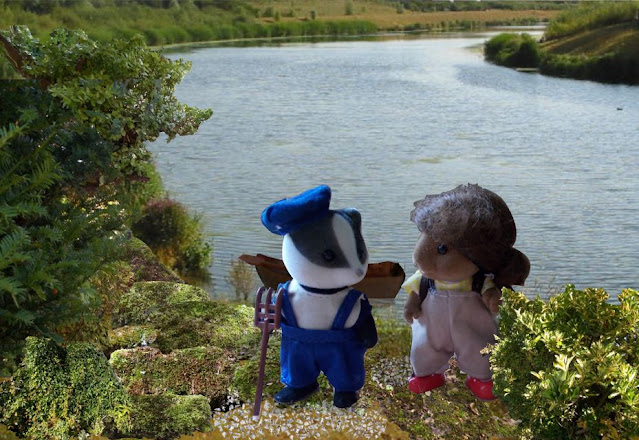In years long past, we generally lived according to the rise and fall of the sun. That didn't mean we all took to our beds following sunset. Life went on, and as some critters adapted better to darkness than others, they took advantage of this nocturnal advantage to shift their working day to the benefit of the community. Badgers, beavers, raccoons and foxes were amongst these, and - had there been any cats resident in Mellowdene back then they would undoubtedly been counted too.
Of course, candles and lanterns helped everyone. I know that some Sylvanian villages went on to use gas, oil or electric lighting, but on the whole Mellowdene didn't follow that route. We found another way to illuminate those dark evenings.
I've no doubts that our location guided us. The valley from which Mellowdene sprung, protected by the loving arms of the mountains, the fertile land nourished from the waters of Sweetwater Lake, unusual minerals and plants - all had contributed to our way of life. Our artificial lighting was another bounty.
o 0 O 0 o
Nancy Waters and her brother Norman Brooks are descendants of "Big Bevis" Brooks, a beaver that worked with ancestors of Blake Underwood and Elma Mulberry to develop our main source of lighting. Norman, Blake and Elma continue the work to this day and the process is more streamlined.
 |
| Diggle Underwood, Big Bevis Brooks, Karl Mulberry |
Close to a series of small waterfalls that feed our river there is a cluster of small caves that provides a home to a colony of spark flies.
At dusk, these chunky insects fly to their feeding grounds. These were downriver on the west bank in soft ground overlooked by the woodlands. In exchange for the nourishing moss that grew there they left their waste - best described as silver filaments that, for the most part, used to wash away in the current.
Big Bevis was intrigued with the filaments he found, how they almost shone under certain conditions. His curiosity led to experimentation and he discovered that - if the filaments were put into sealed containers, they would start to glow. If some pressure was applied, they would glow brighter. He had the beginnings of a predictable artificial lighting system.
For that reason Bevis collaborated with Diggle Underwood to set up their own palettes of moss banks within Mellowdene County itself. Situated east of the river, nestled in the foothills north of the bridge, the moss banks were closer to the spark fly colony.
The rich moss was suitably irrigated and the stable placement made it easier for the spark flies to feed. When the sun edged beneath the horizon, the spark flies were quite happy to divert to the Brooks-Underwood Spark Farm.
Not only was this preferable to the insects, it made harvesting filaments much easier.
Elma Mulberry's ancestor Karl operated a small glassworks with his family. They would blow glass to create bowls and bottles for various purposes - mainly culinary - but it wasn't any difficulty to create small glass bulbs to hold spark fly filaments. A mechanism to adjust the pressure would allow the level of light to be varied.
Today, the process is much more efficient. When continued use of the bulbs makes them inefficient, replacement is simple. I understand the exhausted filaments are returned to the river - as they used to be - and the glass housing recycled.
o 0 O 0 o
Spark bulbs were a significant development in giving Mellowdene society a life after dark. It's not just extending our waking hours and family time at home. Transport can continue after sundown, safely illuminating the roads. Businesses can operate after dark, which is a boon for winter months so that work does not have to be rushed to fit daylight hours. Evening meals at the Mousehole, entertainment at the Bear Pit, social clubs after work - all help our villagers enjoy a full life.
So a big thanks to Big Bevis Brooks. You could say he put the spark in our lives!
o 0 O 0 o











This is very cool, Jackson! I liked reading all about how the spark flies' light is "farmed" and used. The school lesson was a particularly nice touch. My favourite photo though is the lovely one of the glassblower! What is the hot blown glass made of? Or if it is real hot glass from a photo, how did you make this photo work, with Mr Mulberry's arm visible through the pipe? It looks great!
ReplyDeleteGlad you enjoyed it, GreyRabbit. Thank you!
DeleteThe bulb of the blown glass was indeed taken from a real photo. The tube was one of those plastic sheaths that protect paintbrush hairs, and a tiny blob of White-Tak ensured that it stayed in place long enough at Mr Mulberry's mouth. I superimposed the bulb on top, rotated and positioned it at the other end of the tube so that it overlapped a fraction, then graduated the amount of transparency. This helped give the impression that the tube and bulb were one.
The school lesson was a late idea, but I thought how much fun a class of kids would have with little plungers varying the brightness. Some might be a little squeamish learning where the filaments originated, but I could visualise their little faces in wonder. Brendan had to model the device, though!
Take care.